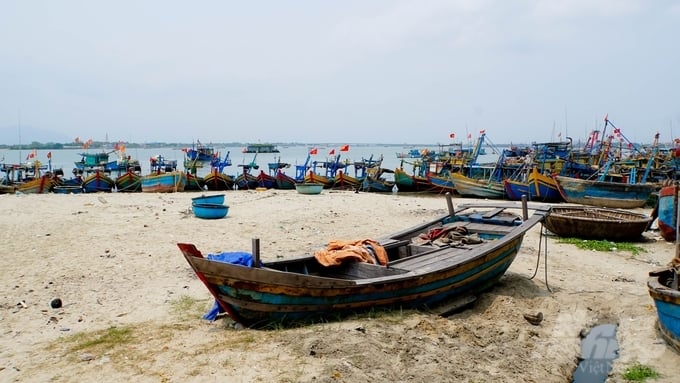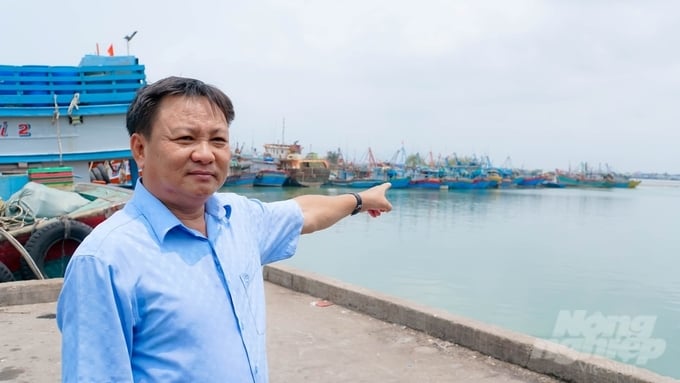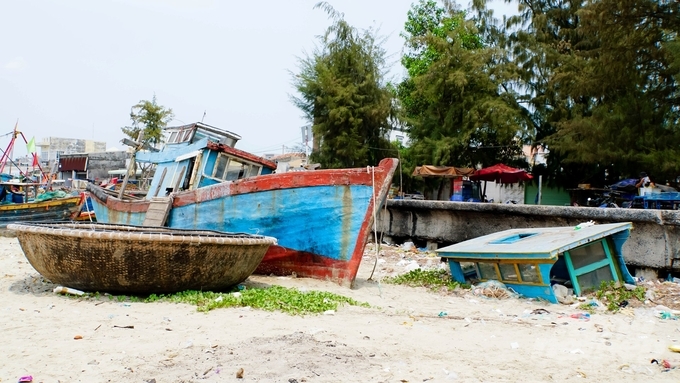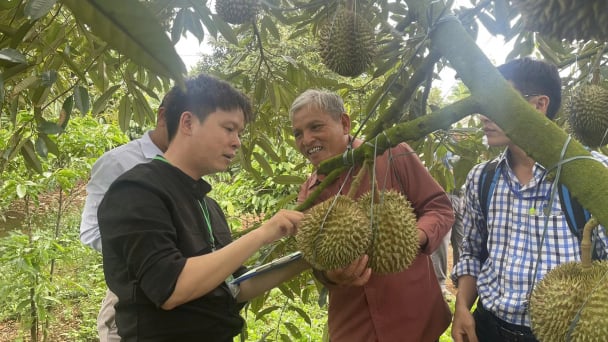June 1, 2025 | 04:07 GMT +7
June 1, 2025 | 04:07 GMT +7
Hotline: 0913.378.918
June 1, 2025 | 04:07 GMT +7
Hotline: 0913.378.918
Phuoc Tinh fishing village (Long Dien district, Ba Ria - Vung Tau province) was once known by many names: “billionaire fishing village” or “the country’s richest fishing village”. In this 300-year-old fishing village, the per capita income used to reach over USD 2,500/year (2004), relatively high compared to the common ground. People there used to have a full and prosperous life, but that’s a story of the past.
Returning to Phuoc Tinh in mid-April 2023, the reporters of Vietnam Agriculture News were surprised because this place no longer had the bustling scene of boats and ships going back and forth.
Mr. Phan Thach, Chairman of Phuoc Tinh Commune People's Committee told us that the locality no longer dared to bear the title of "billionaire fishing village". In recent years, offshore fishing for Phuoc Tinh has gradually disappeared. From 2005 up to this point, people are falling into more and more difficulties. "In recent years, marine natural resources are exhausted. Another thing is that oil and fuel prices for fishing activities are increasing. The debt just piles up after each trip going to the sea," he said.

Empty-handed after each sea trip, unable to gather enough funds to reach out to sea again, the fishing vessels had to lie on the shore one after another, covered in the wind and dew. Photo: Le Binh.
During the past three years, many boat owners here have been taking gambles: If the previous trip was a loss, they put their hope on the next one. But the reality of “going out means loss” is that fishermen could not get anything after making a long trip to the sea, resulting in more debt.
Statistics from Phuoc Tinh Commune People's Committee show that there are nearly 900 boats in the locality (only calculating fishing vessels over 15 m long). Since the outbreaks of Covid-19, there are 70% of the fleet have enough funds to go out to sea, and only 30% of them are able to make some money to breakeven after each trip.

Behind fisherman Nguyen Van Nho are hundreds of boats that had to dock and shut down their engines because of the difficulties surrounding ship owners. Photo: Le Binh.
In addition to rising fuel prices, marine resources gradually drying up, the gradual shortage of labor resources is also one of the reasons that makes the situation in the fishing villages of Long Dien district more and more bleak.
‘Since 2021, the time when the Covid-19 pandemic occurred, there were not many seafarers in the locality anymore. People tend to go ashore in search of a livelihood. By the time the operation at sea resumed, the laborers have already had stable jobs onshore, so the vessel owner suffered a shortage of labor resources. Even if there were enough laborers operating at sea, it requires very high investment capital. On average, if a fleet goes out to sea, the vessel owner must have at least VND 1-1.5 billion in cash. That's a lot of money in these difficult times,” said fisherman Nguyen Van Nho (Phuoc Tinh commune, Long Dien district).
Along the coast of Phuoc Hiep hamlet (Phuoc Tinh commune) there is a "graveyard" filled with fishing vessels worth billions of dong. They used to be considered the "heirloom" of many fishing families in Phuoc Tinh commune. However, they are now being neglected.
But these vessels are still the only "fishing rod" of fishermen here. From a time when fish and shrimp filled the compartments after each trip, now the ships are buried by the sand and water. Exposed to the sun and rain for many years, these ships are left with only their skeletons, decaying into pieces of metal and wood floating on the water.

Many ships were worn out with the frame laid bare. Saying goodbye to the dream of reaching out to sea one more time, ship owners race to sell them off, "ripping vessels to sell scraps", hoping to recover some money and pay off debts. Photo: Minh Sang.
According to Mr. Phan Thach, Phuoc Tinh commune has roughly 290 households with offshore fishing vessels. Currently there are nearly 20 ship owners selling their fishing vessels. some people sell 4-6 vessels at a time, some others sell the whole fleet of 10, all to get ashore and look for a livelihood.
People do not use the term “selling ships”. The correct term used by ship owners is "ripping vessels to sell scraps". Because there's no such thing as a cheap trade, buy a ship for tens of billions of dong, only to sell it for a few hundred million. However, is it better than nothing. Most of the ship owners hope to salvage a few hundred million to somehow pay off debts.
“Call Ho Dai - 100 baskets” is a boat sale cry that left a strong impression on us. No eye-catching signboard, the advertisement was just written in white paint by the boat owner. The “100 baskets” here can be understood as the value of VND 100 million that the owner aspires to sell the boat. But, without a reply, the ship withered away, leaving only the decaying frame behind.
Translated by Samuel Pham

(VAN) For the durian industry to succeed, the value chain must fulfill its commitments to the government, the community, and international partners.

(VAN) Vaccinating juvenile pangasius helps reduce disease, antibiotic use, and farming costs, increasing profits for export-oriented farmers in An Giang.

(VAN) Due to a limited supply of workforce and competitive recruitment requirements, businesses struggle to retain talented veterinary human resources.

(VAN) WOAH’s guidance aims to mitigate disease risks through a One Health approach that balances economic, conservation, and public health interests.

(VAN) Ms. Nguyen Thi Dung, Deputy Director of Ngoc Hoang Cooperative, shared about the journey of bringing dragon fruit to Europe, achieving annual revenues in the billions of VND.

(VAN) Bamboo products from Thang Tho Bamboo Cooperative have reached many countries around the world, while also creating jobs for local workers.

(VAN) The Management Board of Con Dao National Park reported that a green sea turtle, tagged in the Philippines, has traveled thousands of kilometers to lay 84 eggs on Bay Canh Islet.